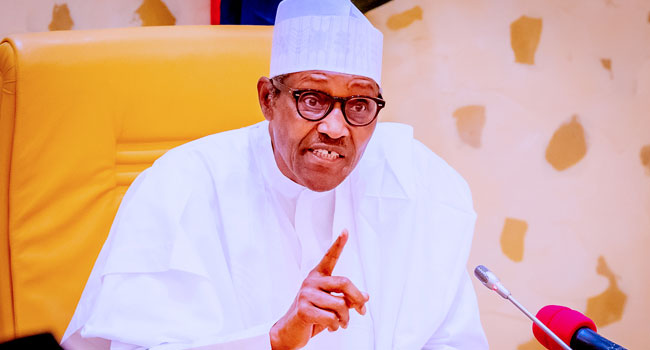Buhari attacks Nigerian media, accuses journalists of ‘reporting irresponsible remarks’
President Muhammadu Buhari, whose government has been accused of clamping down on free speech, has accused the Nigerian media of “just reporting irresponsible remarks.”
The Nigerian leader said this during his televised broadcast to mark Nigeria’s 61st Independence Anniversary.
“Our media houses and commentators must move away from just reporting irresponsible remarks to investigating the truth behind all statements and presenting the facts to readers,” Mr Buhari said.
Mr Buhari’s attack on the media was part of his comments on how some of the violence being perpetrated across Nigeria are caused by remarks people make.
“I will therefore take this opportunity, on this special day that symbolises the unity and oneness of our great nation, to ask all Nigerians to embrace peace and dialogue, whatever your grievances,” the Nigerian leader said.
“The seeds of violence are planted in people’s heads through words. Reckless utterances of a few have led to losses of many innocent lives and destruction of properties,” he said.
While Mr Buhari attacked the media, he appreciated “the large number of our Traditional, Religious and Community leaders as well as other well-meaning Nigerians who, in their various fora are openly spreading the message of peaceful co-existence and conflict settlement through dialogue in their respective communities.”
Faced with growing criticisms over the deteriorating security and economic situation under his watch, Mr Buhari is responding with stringent regulations, policies and legislation to control the traditional and social media space, the free speech channels which citizens also use for the planning and execution of many activities.
In June, the Nigerian government suspended the operations of Twitter indefinitely, after it alleged that the micro-blogging site was being used to undermine “Nigeria’s corporate existence” through the spreading of fake news that has “violent consequences”.
For that reason, the National Broadcasting Commission (NBC), directed broadcasters to suspend “patronage” of the platform. It described its further use by broadcast stations as “unpatriotic.” Many broadcast media stations have since complied with the directive and stopped the use of Twitter.
Media and human rights advocates condemned NBC’s directive, calling it “illegal” and an attack on press freedom.
The government has since asked lawmakers to give the NBC powers to also regulate all “online media.”
Nigerian media organisations have stood against the federal government’s repressive steps, with some approaching the court for redress.
As a push back against these moves, the print and online newspapers widely circulated advertorial campaigns in July.
“Information Blackout,” read the caption that was placed on front pages of newspapers. “It’s not just against the media….it’s about society’s right to know, your right to be heard.”
Another round of media solidarity followed. This time, editorials in major dailies called on the government to shut down the two controversial media bills at the National Assembly.
Mr Buhari and officials of his government are, however, not alone in the criticism of the Nigerian media. Recently, some experts decried the preponderance of fake news which they said had caused divisions along ethnic, religious and geographical lines leading to mutual distrust, suspicion and hatred that had constituted a huge threat to Nigeria’s corporate existence.




